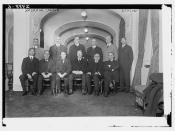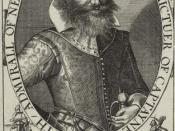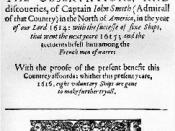Before the English founded Jamestown in 1607, the Pamunkey Americans who lived in the Chesapeake Bay area were aware of the other culture overseas (Kupperman, 1). The Americans had watched the establishment and eventual abandonment of the Roanoke settlement some twenty years before Jamestown and gained knowledge of English society (1). European ships frequented the bay for trade. A Pamunkey man, who the Spaniards took back to Spain and baptized as Don LuÃÂs de Velasco, returned to his homeland in 1571 and further informed the Pamunkeys (1). Though the English would become dominant, the Native Americans might have been the more erudite of the two cultures to clash.
Europeans sent reports home from America and told of complex native civilizations and formidable tribes (Kupperman, 1). In time, the English came to assume that Americans were "accomplished people living in highly developed societies" and to rely their crops and supplies when needed (1).
If one successful population could thrive on that land, then another could surely overtake it ultimately (2).
The Pamunkeys had their own sights for a newly established Jamestown (Kupperman, 1). They understood the typical European behaviors and manipulated them to exert control (1). With over thirty tribes under Pamunkey leader Powhatan's command, the natives kept the mostly inept English apprehensive and directed the trading of goods (1). The colonists traded for and exported furs and gold to Europe (1). For the Americans, metal tools, copper ornaments, glass beads and other Europeans products benefited them greatly in exchange (1). The Pamunkeys and their allies had power over the trade westward inland, therefore expanding their influence (2).
True to form, the English settlers were incompetent with coping in the New World and became dependant to the natives for support (Kupperman, 2). As the two sides learnt more of each other...


